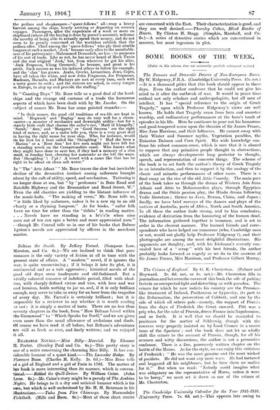SOME BOOKS OF THE WEEK.
Welke in this column does not necessarily nrecluie subsequent ream.]
The Dramas and Dramatic Dances of Non-European Races. By W. Ridgeway, F.B.A. (Cambridge University Press. ills, net. —It is a thousand pities that this book should appear in these days. Even the author confesses that he could not give his mind to it after the outbreak of war. It would in peace time enthral not only scholars and anthropologists, but all men of intellect. It has "special reference to the origin of Greek Tragedy," upon which Professor E idgeway's views are well known. He holds that Tragedy arose from hero and ancestor worship, and rudimentary performances at the hero's tomb of episodes in his life. Here he continues to pour out his humorous and good-tempered scorn upon the theories of Sir James Frazer, Miss Jane Harrison, and their followers. He cannot away with their Winter and Summer myths, Vegetation parables, the Eniautos Daimon and Corn Spirit. His wide knowledge con- firms his robust common-sense, which is sure that it is absurd to suppose that any primitive people thought in abstractions, which are always developments long posterior to thought, speech, and representation of concrete things. The scheme of the.• book is to set forth the author's theory of Greek Tragedy in an introduction, and then to support it by the analogy of the choric and mimetic performances of other races. There is a final essay on the rise of the old Attic Comedy. The main part of the book takes us through the drama of Western Asia from Adonis and Attis to Mohammedan plays, through 'Egyptian drama and the Osiris passion play, the Hindu drama following Vedic literature ; thence to Java, Burma, China, and Japan ; finally, we have brief surveys of the dances and plays of the natives of Australia, parts of Africa, North and South America. In all these the author finds strong, and to him conclusive, evidence of derivation from, the honouring of the human dead. The information gathered together is immense, and is set in order in the clearest manner. The learned friends and corre- spondents who have helped are numerous (who, Cambridge man or not, would not gladly help Professor Ridgeway ?), and their photographs are among the most delightful illustrations. His opponents are doughty, and, with his Irishman's scarcely con- cealed love of a " scrap " with his best friends, the author probably looks forward as eagerly as we do to the answers of Sir James Frazer, Miss Harrison, and Professor Gilbert Murray.


































 Previous page
Previous page